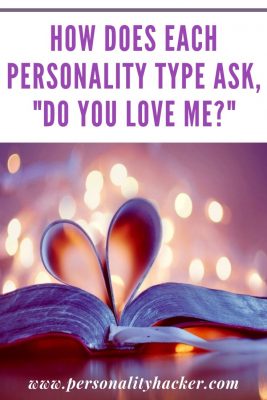In any romantic or pair bond relationship, there are myriad ways that a couple communicates to each other. Words, actions, expressions, mannerisms… we’re looking for and sending endless signals to and from our mate.
And while there are a million things each person says (both verbally and non-verbally) every day, it could be argued that there really is only one thing we’re actually looking for: the answer to the question, “Do you love me?”
According to Gary Chapman’s “The 5 Love Languages” we all express love a little differently. In Chapman’s model, the 5 primary ways are:
- Acts of Service
- Quality Time
- Gift Giving
- Words of Affirmation
- Physical Touch
(For a quick reference listen to the Personality Hacker podcast “The 5 Love Languages.” For more in-depth information, read Chapman’s book of the same title. It’s a great read – we highly recommend it.)
These are five very important modalities of communicating love, and knowing which one you and your mate favor can make or break the relationship. That said, while we communicate love in different ways, we are also looking for very specific markers that transcend the form of communication – we’re looking for specific criteria which means love to different types.
For example, we might have a “Words of Affirmation” Love Language and we’ll always feel good when someone praises us. But what are they praising us for? Does it match our internal ‘list’ of important things? For example, one woman might be over to moon to hear her husband praise her beauty to his friends, and another woman might feel marginalized.
How “Evaluation” Becomes “Love”
In our program Couples Mapping we discuss how different personality types both ask the question, “Do you love me?” and how they answer it, “Yes! I do love you!” Here’s where it gets tricky: each personality type asks it in a slightly different way, and concurrently answers it in a slightly different way.
|
A quick refresher on how the 16 Myers-Briggs personality types correlate to their 'decision-making' mental processes: All FJs use the mental process called Extraverted Feeling, or “Harmony” to make decisions. All FPs use the mental process called Introverted Feeling, or “Authenticity” to make decisions. All TJs use the mental process called Extraverted Thinking, or “Effectiveness” to make decisions. All TPs use the mental process called Introverted Thinking, or “Accuracy” to make decisions. |
The “decision-making” mental processes (Harmony, Authenticity, Effectiveness, Accuracy) are ways we evaluate the world and determine their rightfulness, truthfulness and importance to us as people.
Every personality type has a tendency to overvalue their criteria, and unless you understand the concept of different types it’s very easy to assume others are using the same criteria to make evaluations and decisions. That is, if you’re an Effectiveness person it may be very difficult to understand another person who is using, say, Accuracy. When they come to a conclusion that favors conceptual analysis over what works, the assumption is that person is being short-sighted, and somewhat stupid.
Since we all do this (to some extent), in a romantic relationship this can be disastrous. On some level we ‘get’ that other people see the world differently than we do, but without a solid model these differences end up becoming gender stereotypes. “Women just want men to listen to them and not solve problems,” or “Men just want to be alone in their ‘man cave’ when they have problems.”
Since there is definitely a gender skew in personality types, these stereotypes play out often enough that we take them for granted. Real trouble surfaces when we’re a personality type not common to our gender but we’re still expected to play out the normal ‘script’. When our mate can’t ‘read’ or ‘predict’ us (or vice versa!) it can become a serious issue.
It’s a frustrating exercise trying to communicate love (and look for markers of love from your mate) only to watch the attempts fall flat. In most things to ‘fail again, fail better’ is a noble pursuit, but in love if we believe the answer to our question “Do you love me?” is “No” or “I’m not sure” too often, you can do real damage to your own heart and your mate’s.
Knowing your own decision-making process and your lover’s is a much easier way of being able to say clearly, “When I look for love, this is what I’m looking at.”
How “Harmony” asks “Do you love me?”Myers-Briggs types: ENFJ, INFJ, ESFJ, ISFJ
How “Harmony” answers: “Yes! I love you!”
|
How “Authenticity” asks, “Do you love me?”
|
How “Effectiveness” asks, “Do you love me?”
|
How “Accuracy” asks, “Do you Love Me?”
|
Did this resonate with you and what you know of your type? Were you able to spot your lover’s decision-making criteria, and how can it help you communicate to them that you love them in a way that’s meaningful to them?
Let us know! Leave a comment and share your experience.
-Antonia
Interested in gaining deep insight into how you and your lover operate within your relationship? Want to get to the next level of intimacy on a deep, cognitive level? This article is just a taste of our full course “Couples Mapping: Personality Types in Marriage & Relationships."
When you’re ready, here are five ways we can help you grow…
1. Reclaim Authorship of Your Life (Free Audio): Become the Main Character Your Own Life
2. Regulate your Body, Emotions, Thoughts, & Intuition with Self-Regulation Mastery
3. Understand yourself at a deeper level with a Personality Owners Manual
4. Master the Art of “Deep Reading” people in Profiler Training
5. Rewire your Brain & Build a Life that Fits You in the Personality Life Path


Share:
Question from Readers - Best Books for ENFJ Growth
When You ALMOST Know Your Personality Type (aka "Between Two Types")
42 comments
I am an INTP and this is absolutely spot on. My wife is an ENFJ, and she literally asks me those exact questions every single day. Words of affirmation are totally foreign to me — I find little to no value in someone telling me they love me, but my wife cooking dinner or picking up my dry cleaning makes me downright emotional. Meanwhile, my wife needs me to confess my love for her every day, multiple times per day, and needs me to verbally acknowledge how much she means to me over and over. Researching and studying love languages and personality types, and taking in all the information I can on how to accommodate other personality types, primarily my wife’s, has drastically improved my work and social lives.
New to this page and love it! Probably saved my marriage. Thanks.
Well said! As an INFJ,I believe you’ve got it spot on :-D
Very accurate :D I am an ENFP and from my personal relationships with INFJ / INTJ / ENTP I agree with all of the responses evaluated for those types here, completely :)
As an ENFP I also find myself most drawn to the responses under the INTJ (best matched type)’s list.
Love this! I’m an INFJ, and I very much agree with what you’ve written. Nice job!